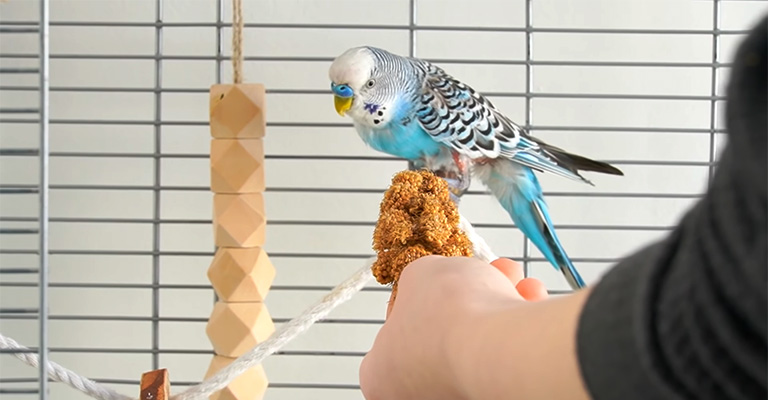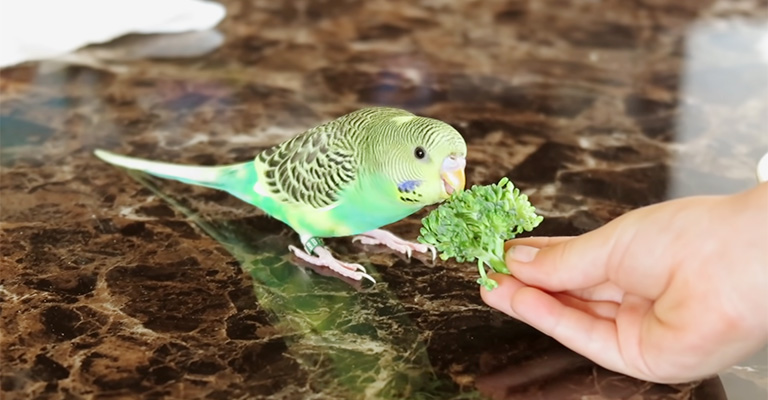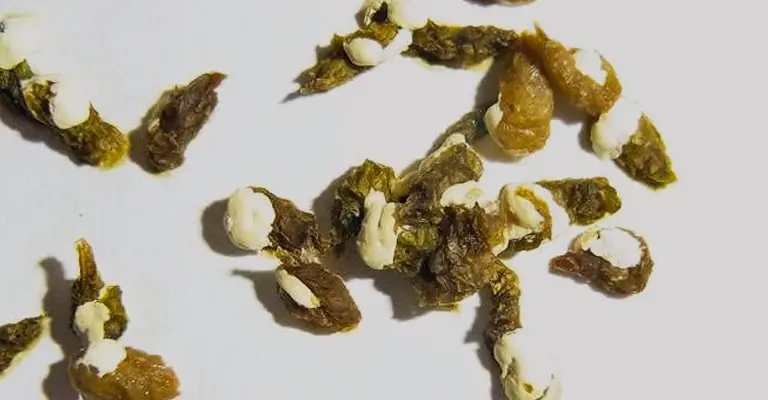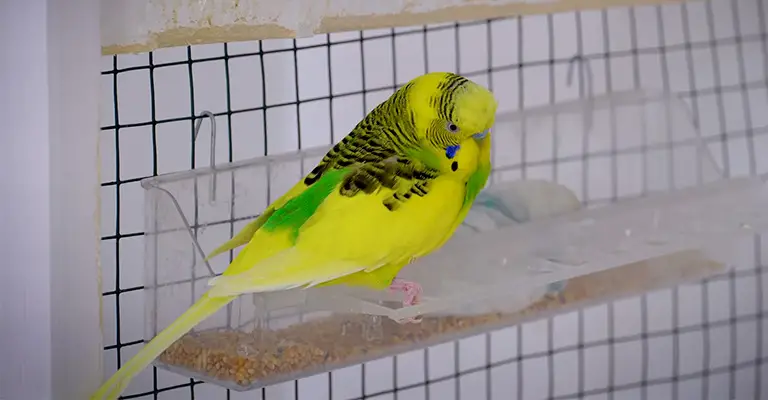If you’re a proud budgie owner, you’ve probably noticed that your feathered friend’s droppings can vary in size, color, and texture. However, it’s not uncommon for pet owners to become concerned when they observe tiny, seed-sized droppings from their 1-year-old budgies.
Is this normal, or could it indicate a potential health issue? In this article, we’ll delve into ‘Why is my 1-year-old budgies poop really small, a seed size’. We’ll explore various factors, including diet, hydration, age-related changes, and potential red flags to watch out for.
Understanding what’s behind these diminutive droppings can help you ensure your budgie’s well-being and provide the best care possible.
So, if you’ve ever wondered about the mysteries of your budgie’s petite poops, read on to uncover the answers and gain valuable insights into your avian companion’s health.

Why Is My 1-Year-Old Budgie’s Poop Really Small, a Seed Size?
It’s essential to observe your budgie’s overall health and behavior, as well as their droppings. Tiny, seed-sized droppings in a 1-year-old budgie can be attributed to a few factors:
Diet
Budgies primarily eat seeds, and if their diet consists mostly of seeds, their droppings are likely to be small and seed-sized. A more varied diet, including fresh vegetables and fruits, can lead to larger, healthier droppings.
Hydration
Dehydration can result in smaller droppings. Ensure your budgie has access to clean, fresh water at all times to maintain proper hydration.
Age-related Changes
As budgies grow and mature, their digestive system can change. Younger budgies may produce smaller droppings, which can gradually change in size as they age.
Health Concerns
While small droppings can be normal, monitor your budgie for any signs of illness such as changes in behavior, weight loss, or unusual droppings. If you have concerns about your budgie’s health, consult with an avian veterinarian.
Stress
High levels of stress or anxiety in a budgie can affect its digestion and result in smaller droppings. Ensure your budgie has a calm and secure environment to minimize stress.
Lack of Fiber
A diet lacking in fiber, common in seed-heavy diets, can lead to small droppings. Introducing fibrous foods like leafy greens and vegetables can help improve droppings’ size and consistency.
Digestive Issues
Budgies, like all birds, can experience occasional digestive problems that might result in small droppings. If this continues or is accompanied by other symptoms, consult a vet for a proper diagnosis.
It’s crucial to provide your budgie with a balanced diet, fresh water, and regular health check-ups to ensure their overall well-being. If you notice any unusual or persistent changes in their droppings or behavior, consult a vet for a thorough evaluation.
How to Solve This Issue?

To address the issue of your 1-year-old budgie producing small, seed-sized droppings, you can take the following steps:
Dietary Changes
Modify your budgie’s diet to ensure it’s getting a balanced and nutritious mix of foods. While seeds are a staple, incorporate fresh vegetables, fruits, and leafy greens into their diet. This will provide essential vitamins, minerals, and fiber that can lead to healthier droppings.
Hydration
Make sure your budgie always has access to clean, fresh water. Proper hydration is crucial for maintaining healthy digestion and droppings.
Reduce Stress
Create a calm and secure environment for your budgie. Minimize loud noises, limit disturbances, and provide toys and activities to keep them mentally and physically stimulated.
Regular Vet Check-ups
Schedule regular check-ups with an avian veterinarian to monitor your budgie’s health. They can identify and address any underlying health issues that might be affecting the droppings.
Monitor Behavior
Keep a close eye on your budgie’s behavior. Any changes in activity levels, appetite, or behavior can be early indicators of health issues. Address these changes promptly.
Cleanliness
Maintain a clean cage by regularly cleaning out droppings and providing fresh bedding. A clean environment contributes to a healthy budgie.
Supplements
Consult your vet about the need for any specific supplements that might benefit your budgie’s health.
Remember that individual budgies may have different needs and responses, so it’s essential to consult with a qualified avian veterinarian for personalized advice and guidance tailored to your budgie’s specific situation.
By addressing these factors, you can work toward improving your budgie’s droppings and overall well-being.
What are the Signs of a Healthy Budgie Poop?

Healthy budgie droppings typically exhibit the following characteristics you need to look out for to judge their health condition:
Color
The feces should be a dark green or brownish color, reflecting the color of the food they eat. The urates (the white part) should be chalky white.
Consistency
The feces should be well-formed and not too runny or overly dry. It should hold its shape but still be easy to clean.
Separation
There should be a clear separation between the feces (dark part) and the urates (white part). This separation indicates healthy digestion.
Frequency
Budgies typically pass droppings several times a day. Normal droppings should be consistent in frequency.
Size
While droppings can vary in size, they should not be excessively small or excessively large. Healthy budgie droppings are usually larger than a grain of rice but not significantly so.
No Straining or Blood
Your budgie should not appear to strain or have difficulty passing droppings. Straining can be a sign of digestive issues.
There should be no signs of blood in the droppings. Any red or bloody discoloration is a concern and should be promptly addressed by a veterinarian.
No Unusual Odor
Healthy budgie droppings should not have a strong or foul odor. An unusually strong smell can indicate digestive problems. Regular monitoring of your budgie’s droppings is a helpful practice for gauging their overall health.
Remember that budgie droppings can vary slightly depending on their diet and hydration levels.
However, if you notice consistent changes in color, consistency, or frequency, it’s essential to consult with an avian veterinarian to rule out any underlying health issues and ensure your budgie’s well-being.
Do Budgies Experience Constipation?

Yes, budgies can experience constipation, just like other animals. Constipation in budgies occurs when there is difficulty or infrequency in passing feces, resulting in a buildup of stool in the digestive tract.
There are several reasons why budgies might experience constipation:
Dietary Factors
A diet that lacks sufficient fiber can contribute to constipation in budgies. Budgies primarily eat seeds, which are low in fiber. An imbalanced diet with too few fresh vegetables and fruits can lead to digestive issues.
Inadequate hydration can make the stool dry and hard, making it difficult to pass. Budgies need access to clean, fresh water at all times to stay properly hydrated.
Illness or Injury
Any underlying health condition or injury that affects the digestive system, such as a gastrointestinal blockage or infection, can lead to constipation.
For instance, if a budgie ingests a foreign object or substance that cannot be digested, it might create a blockage in the gastrointestinal tract. Infections, such as bacterial or fungal infections, can disrupt normal digestion, leading to constipation.
These conditions may result in changes in the consistency and frequency of droppings, and if not addressed promptly, they can lead to more severe complications.
Stress
High levels of stress or anxiety can impact a budgie’s digestive system, potentially causing constipation. A stressful environment or recent changes in their surroundings can contribute to this.
When a budgie experiences high levels of stress or anxiety, it can trigger physiological responses that affect digestion. Stress hormones can slow down digestive processes, leading to constipation.
Stressors in their environment, such as loud noises, the presence of predators (including other pets), overcrowding, or even a sudden change in their living conditions, can all contribute to heightened stress levels.
Aging
As budgies age, their metabolism and digestive processes may change, making them more prone to constipation. Just like humans and many other animals, budgies undergo changes in their body as they age.
These changes can include a slowing of metabolic processes, reduced muscle tone, and alterations in digestive function.
To prevent constipation in budgies, it’s essential to provide a balanced diet that includes fresh vegetables, fruits, and occasional treats like millet spray. Ensure they have access to clean water and maintain a stress-free environment.
If you suspect your budgie is constipated, or if it persists, consult with an avian veterinarian for a proper diagnosis and treatment plan to alleviate the issue and prevent further complications.
FAQs
Signs of illness in budgies include changes in behavior (lethargy, loss of appetite), abnormal droppings, fluffed feathers, and wheezing. If you notice any of these signs, consult an avian veterinarian.
A balanced diet for budgies includes a variety of seeds, fresh vegetables (like leafy greens, carrots, and bell peppers), fruits (in moderation), and occasional treats. Provide clean, fresh water daily.
Building trust with a shy budgie takes time and patience. Spend time near the cage, offer treats from your hand, and speak to them softly. Gradually, they may become more comfortable and willing to interact.
Budgies are social birds and often benefit from having a companion of the same species. However, some budgies are content as single pets if they receive plenty of attention and mental stimulation from their owners.
Offer a variety of toys, perches, and puzzles in the cage. Rotate toys regularly to prevent boredom. Budgies also enjoy flying and exploring outside the cage in a safe, supervised environment.
Conclusion
While tiny, seed-sized droppings in a 1-year-old budgie can often be completely normal, it’s essential for bird owners to remain vigilant about their pet’s overall health.
These small droppings can result from a seed-heavy diet, but they should be balanced with fresh vegetables and water to ensure proper nutrition and hydration.
Regularly monitoring your budgie’s droppings is a valuable practice, as any sudden changes in color, consistency, or frequency could be indicators of underlying health concerns.
If you ever notice persistent abnormalities or your budgie exhibits signs of illness, such as lethargy or a change in behavior, it’s crucial to consult with an avian veterinarian for a thorough evaluation.
Remember that a healthy budgie is a happy budgie, so maintaining a balanced diet, providing clean water, and creating a safe, stimulating environment will contribute to your feathered friend’s well-being.